You’ll transform your kitchen into a thriving green sanctuary with the right selection of indoor plants. From compact herbs that enhance your cooking to air-purifying varieties that create a healthier environment, each plant serves a specific purpose in your culinary space. Whether you’re working with a sunny windowsill or a dimly lit corner, there’s a perfect plant combination that fits your kitchen’s conditions and your lifestyle needs. Discover how these ten essential plants can revolutionize both the function and beauty of your cooking area.
Contents
- 1 Choosing the Perfect Windowsill Herbs for Fresh Cooking
- 2 Low-Maintenance Succulents for Kitchen Countertops
- 3 Hanging Plants to Maximize Vertical Space
- 4 Air-Purifying Plants for a Healthier Kitchen
- 5 Pet-Safe Kitchen Plants for Family Homes
- 6 Stylish Plant Containers and Display Solutions
- 7 Best Kitchen Plants for Low-Light Conditions
- 8 Seasonal Plants to Rotate Throughout the Year
- 9 Space-Saving Corner Plant Arrangements
- 10 Water-Wise Plants for Busy Kitchen Environments
Choosing the Perfect Windowsill Herbs for Fresh Cooking
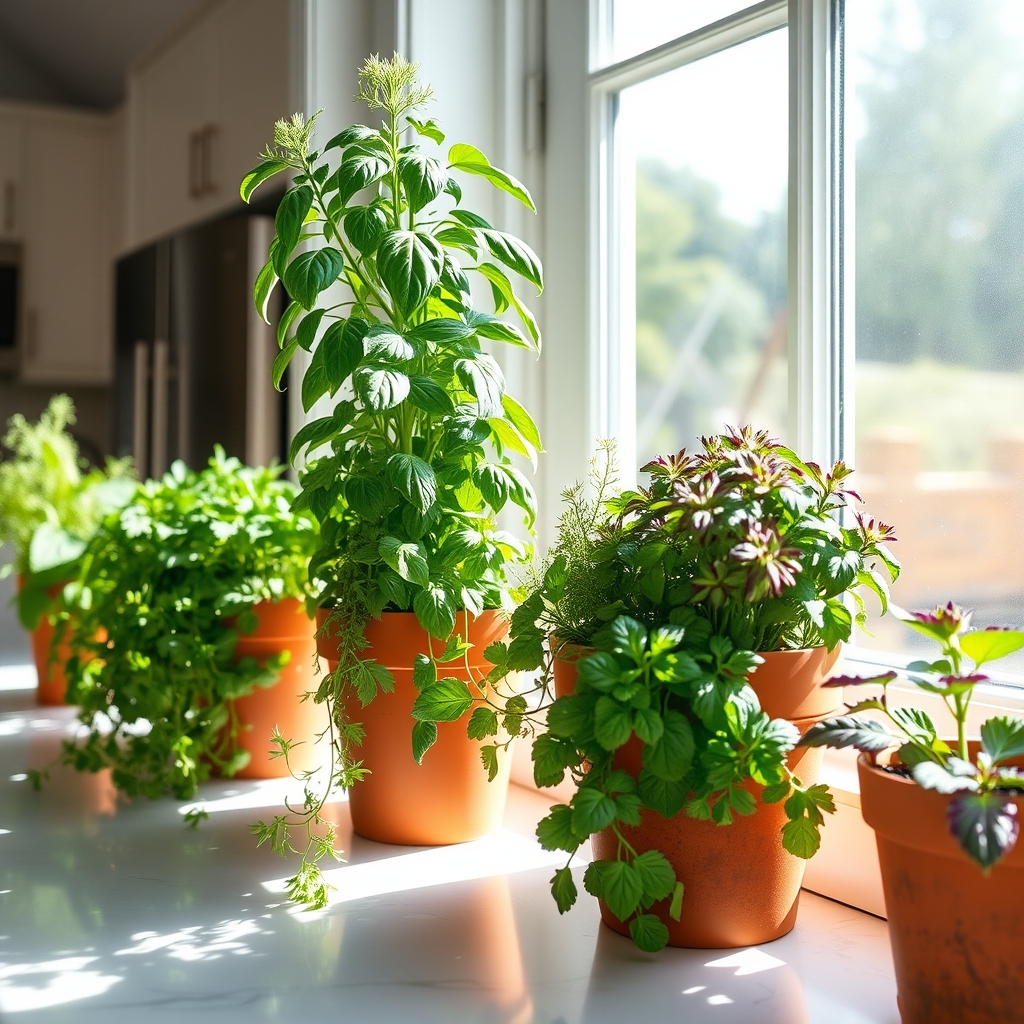
Windowsill herbs create a functional and decorative mini garden that brings life to kitchen spaces while providing fresh ingredients for cooking.
These compact plants typically grow 6-12 inches tall in small pots arranged along sunny kitchen windows. Most culinary herbs feature aromatic leaves in varying shades of green, with some varieties offering purple, silver, or variegated foliage.
Popular windowsill herb choices include:
- Basil (bright green leaves, compact growth)
- Thyme (tiny leaves, spreading habit)
- Mint (vigorous growth, spreading stems)
- Chives (grass-like upright growth)
- Parsley (crinkled or flat leaves, bushy form)
The unique feature of windowsill herbs is their dual purpose: they serve as living decor while providing instant access to fresh flavors for cooking.
These plants thrive in 6-inch pots with well-draining soil and require at least 4-6 hours of direct sunlight daily. Regular trimming encourages bushier growth and ensures a continuous supply of fresh herbs for culinary use.
Low-Maintenance Succulents for Kitchen Countertops
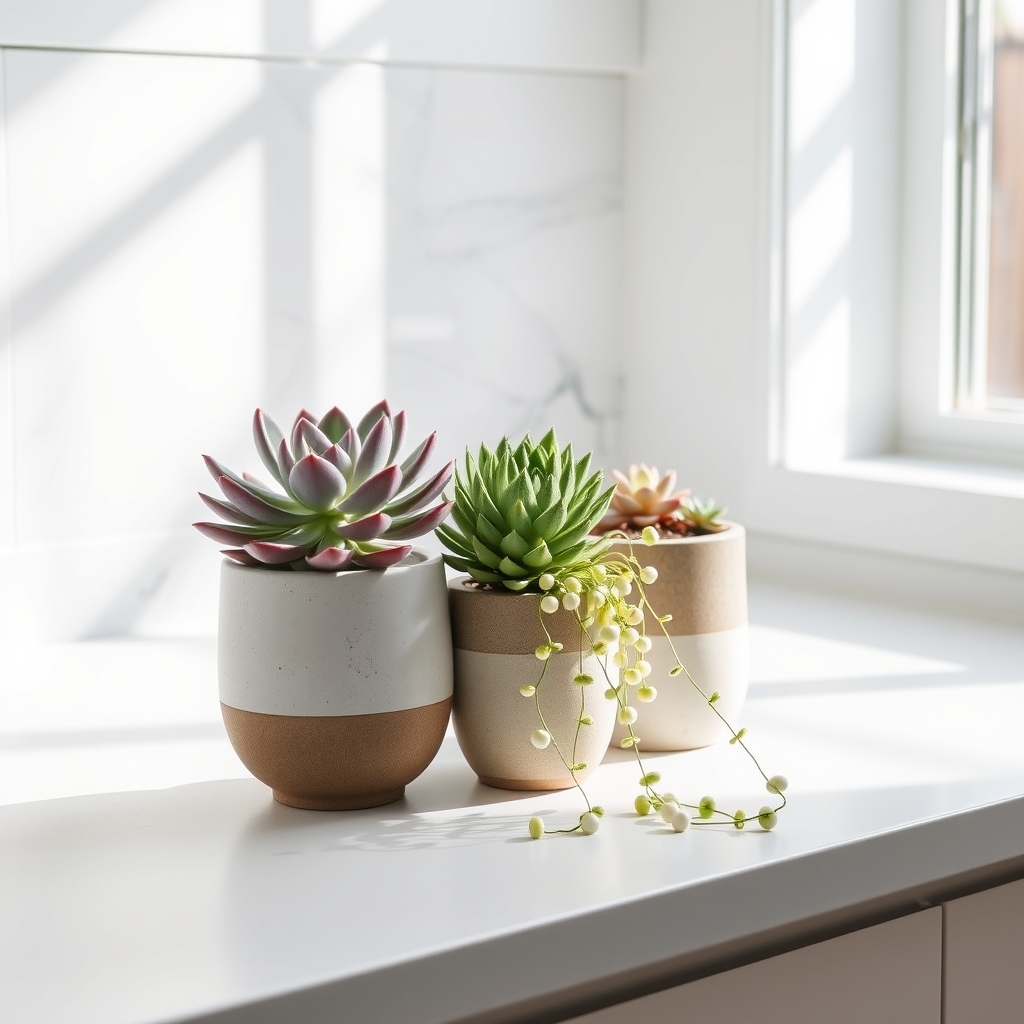
Low-maintenance succulents are compact, water-retaining plants ideal for kitchen countertop decoration. These plants feature thick, fleshy leaves in various shapes, from rosettes to trailing stems, and come in colors ranging from soft greens to blues, purples, and pinks.
Their unique ability to store water in their leaves means they require minimal watering, making them perfect for busy kitchens.
Common countertop varieties include Echeveria, Haworthia, and String of Pearls, which can thrive in small decorative containers or modern geometric planters. These succulents adapt well to indoor conditions and can withstand varying light levels typically found in kitchen environments.
Most kitchen-friendly succulents remain small, rarely exceeding 6 inches in height, preventing them from interfering with food preparation spaces.
Succulents’ distinctive characteristic is their drought-resistant nature, requiring watering only every 2-3 weeks, which helps prevent water damage to countertops and reduces maintenance needs.
Hanging Plants to Maximize Vertical Space
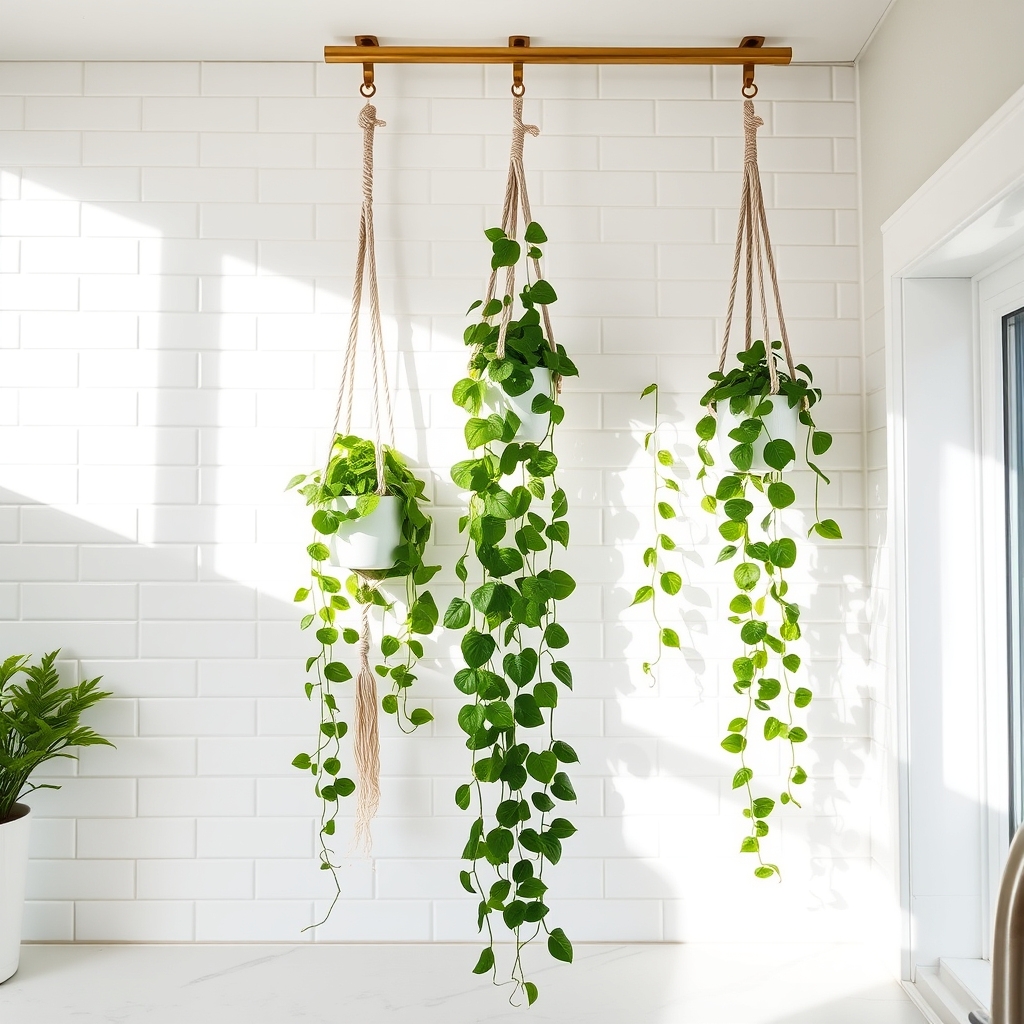
Hanging plants transform unused vertical kitchen space into lush, living displays while keeping countertops and surfaces clear.
These suspended greenery arrangements typically feature trailing varieties like pothos, spider plants, or string of pearls cascading from ceiling-mounted hooks, floating shelves, or mounted rail systems.
Plants can be displayed in decorative macramé holders, ceramic hanging planters, or repurposed containers, creating dynamic layers of foliage at varying heights.
The vertical positioning allows plants to naturally grow downward, creating curtains of leaves that add movement and organic texture to kitchen walls without consuming valuable work areas.
Key features:
- Space-saving vertical garden solution
- Customizable height arrangements
- Natural air-purifying benefits
- Creates visual interest at eye level
- Easy access for watering and maintenance
Air-Purifying Plants for a Healthier Kitchen
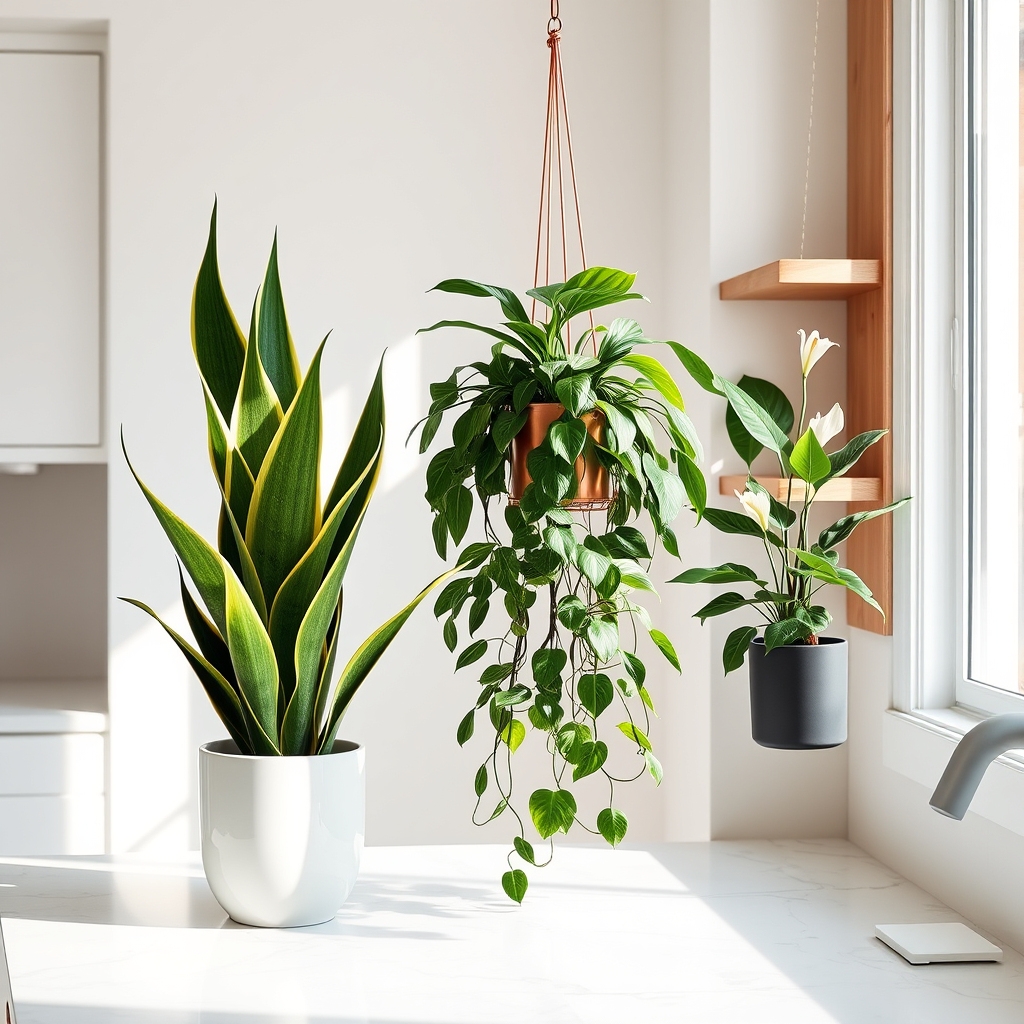
Air-purifying plants for the kitchen serve as natural filters that remove common indoor pollutants while adding organic beauty to the space.
These plants actively absorb toxins like formaldehyde, benzene, and carbon monoxide through their leaves and roots.
Popular air-purifying kitchen plants include:
Snake Plant (Sansevieria)
- Tall, upright leaves with yellow edges
- Thrives in low light
- Removes formaldehyde from the air
- Converts CO2 to oxygen at night
Spider Plant (Chlorophytum)
- Arching green and white striped leaves
- Produces hanging plantlets
- Filters xylene and carbon monoxide
- Easy to maintain
Peace Lily (Spathiphyllum)
- Glossy dark leaves with white flowers
- Removes multiple air toxins
- Helps reduce mold spores
- Tolerates kitchen humidity
These plants require minimal care while providing maximum air-cleaning benefits, making them ideal for busy kitchen environments.
Pet-Safe Kitchen Plants for Family Homes
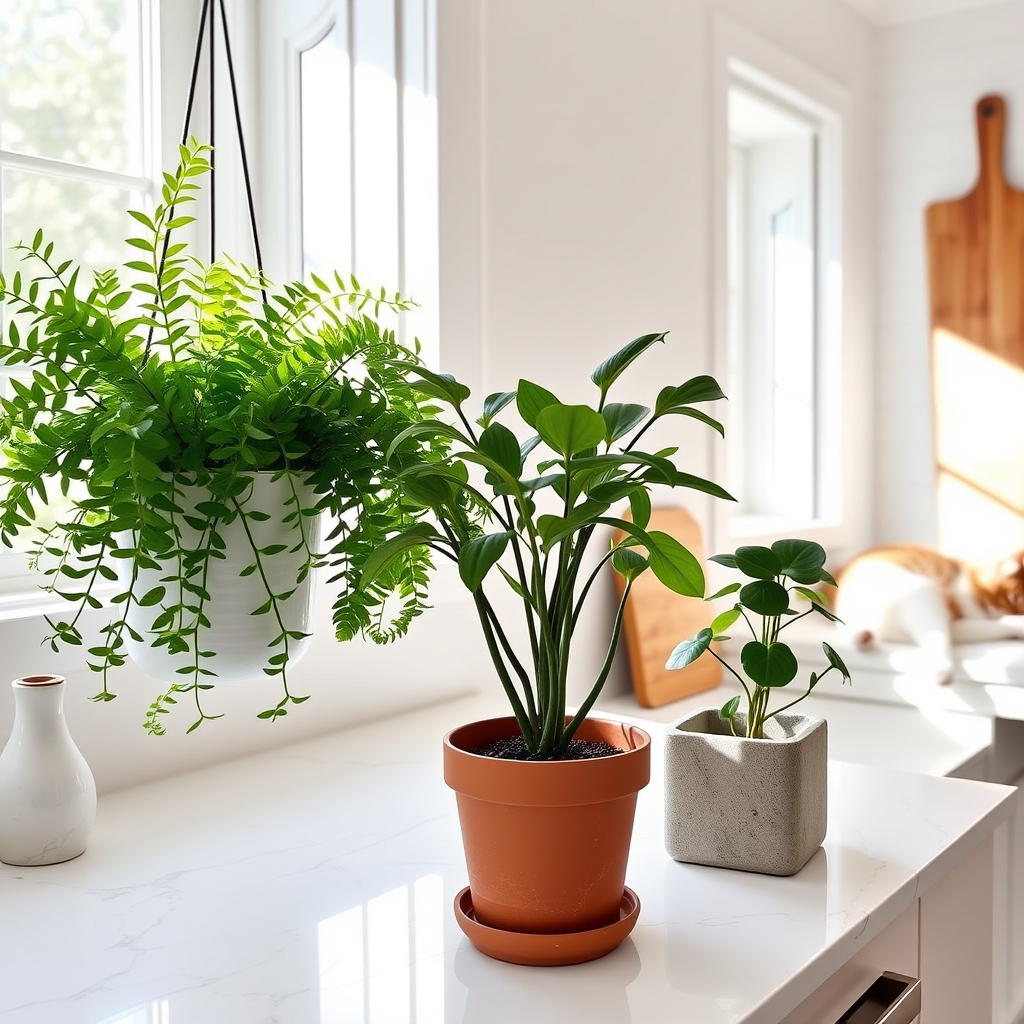
Pet-Safe Kitchen Plants for Family Homes describes a curated selection of non-toxic houseplants specifically chosen for households with pets.
These plants create an inviting atmosphere while ensuring the safety of cats, dogs, and other domestic animals. Common examples include the Boston Fern with its feathery fronds, the sturdy Spider Plant with its arching leaves, and the compact Chinese Money Plant with round, coin-shaped foliage.
Each plant serves dual purposes – adding natural beauty to kitchen spaces while being completely safe if accidentally ingested by curious pets.
These plants typically thrive in indirect light conditions common in kitchens and require minimal maintenance, making them practical choices for busy family environments.
Stylish Plant Containers and Display Solutions
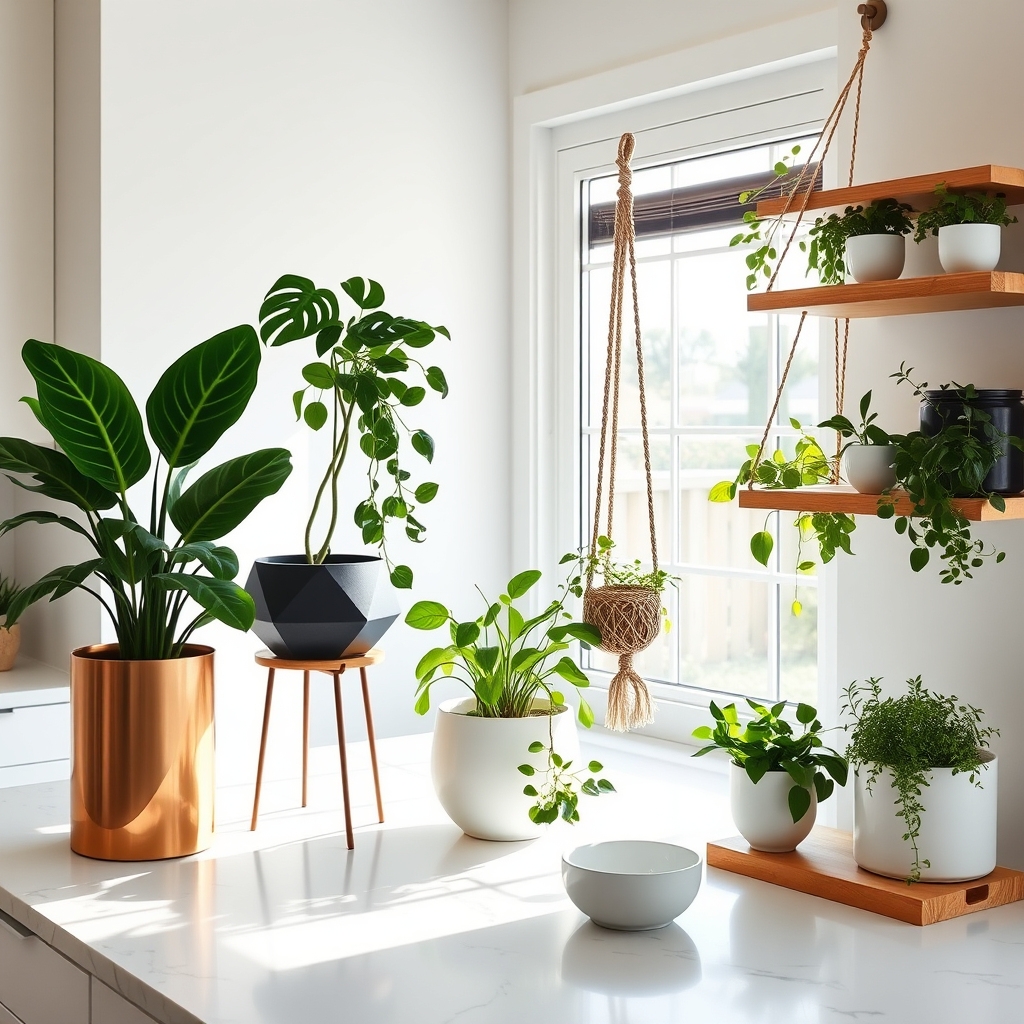
Stylish plant containers and display solutions transform ordinary houseplants into striking decorative elements for kitchen spaces.
Modern options include sleek ceramic pots, hanging macramé planters, geometric wall-mounted holders, and multi-tiered plant stands. Metal containers in copper, brass, or matte black finishes add industrial chic, while natural materials like terra cotta, bamboo, and woven baskets bring organic warmth.
Key display features incorporate:
- Window sill organizers with multiple compartments
- Counter-top plant risers at varying heights
- Under-cabinet hanging systems
- Floating shelves dedicated to plant arrangements
- Corner plant ladders maximizing vertical space
- Magnetic planters for refrigerator or metal surfaces
- Adjustable plant brackets for flexible positioning
These containers often include drainage solutions, water catch trays, and self-watering mechanisms designed specifically for kitchen environments.
Size variations accommodate both small herbs and larger statement plants while maintaining a cohesive aesthetic throughout the space.
Best Kitchen Plants for Low-Light Conditions
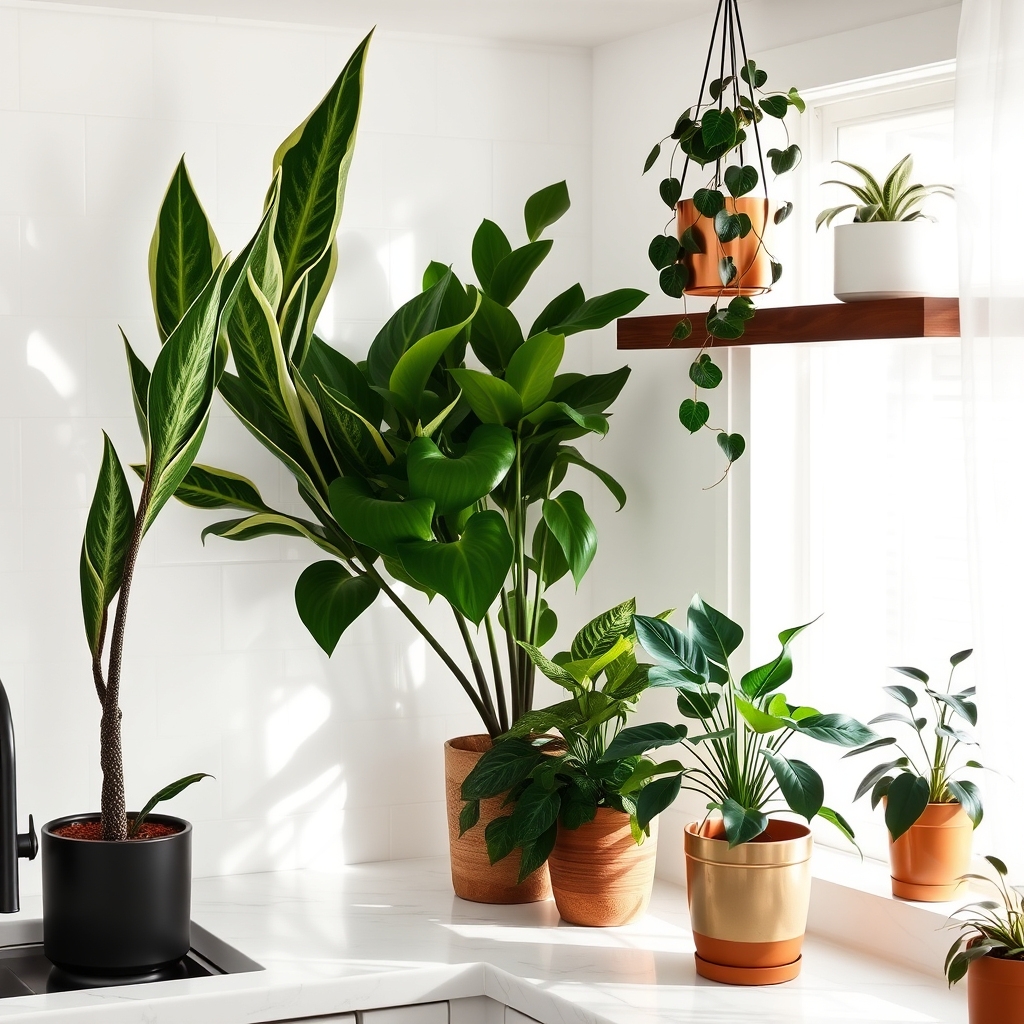
Several hardy plants thrive in kitchens with minimal natural light:
Snake Plant (Sansevieria)
- Tall, upright leaves with variegated patterns
- Tolerates deep shade
- Purifies air by removing toxins
- Requires minimal watering
ZZ Plant (Zamioculcas zamiifolia)
- Glossy, dark green leaves
- Thrives in artificial light
- Nearly indestructible
- Drought-tolerant
Chinese Evergreen (Aglaonema)
- Broad, patterned leaves in silver and green
- Adapts well to low-light corners
- Compact growth habit
- Humidity-loving
Pothos
- Heart-shaped leaves with trailing vines
- Available in various color variations
- Grows well under fluorescent lights
- Easy to propagate
Cast Iron Plant (Aspidistra elatior)
- Long, dark green leaves
- Extremely resilient
- Withstands temperature fluctuations
- Perfect for dark corners
These plants maintain their appearance and health even in shadowy kitchen spaces, requiring minimal maintenance while adding natural beauty to the room.
Seasonal Plants to Rotate Throughout the Year
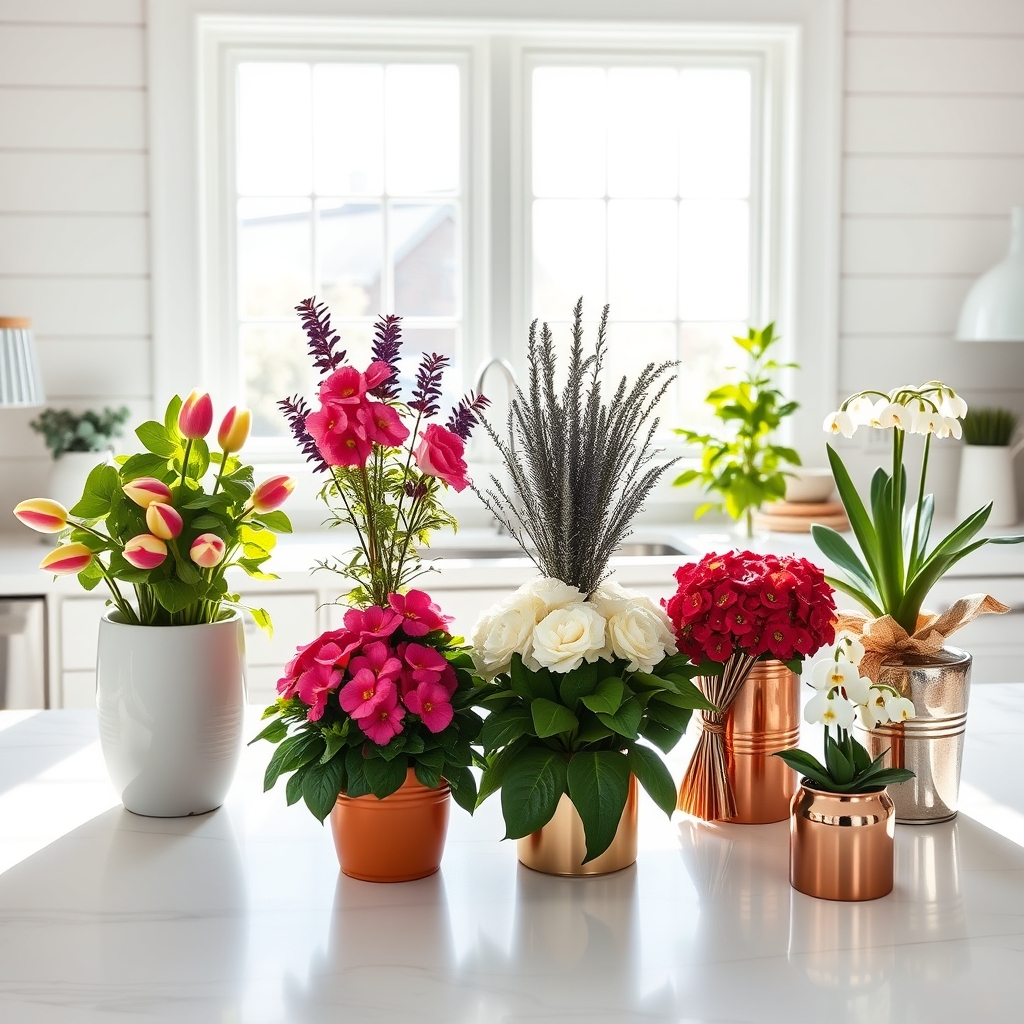
Seasonal Plants to Rotate Throughout the Year:
Spring:
- Tulips and daffodils in decorative pots
- Fresh herbs like basil and mint starting to sprout
- Easter lilies adding height and fragrance
Summer:
- Bright geraniums in window boxes
- Aromatic rosemary and lavender
- Colorful succulents requiring minimal care
Fall:
- Ornamental peppers with multicolored fruits
- Chinese evergreen with variegated leaves
- Chrysanthemums in rich autumn hues
Winter:
- Paperwhite narcissus for indoor blooms
- Christmas cactus with delicate flowers
- Norfolk Island pine as a compact evergreen
Benefits:
- Provides year-round visual interest
- Matches seasonal themes and holidays
- Ensures plants thrive in their natural growing seasons
- Creates dynamic kitchen displays
- Offers fresh herbs when in season
Space-Saving Corner Plant Arrangements
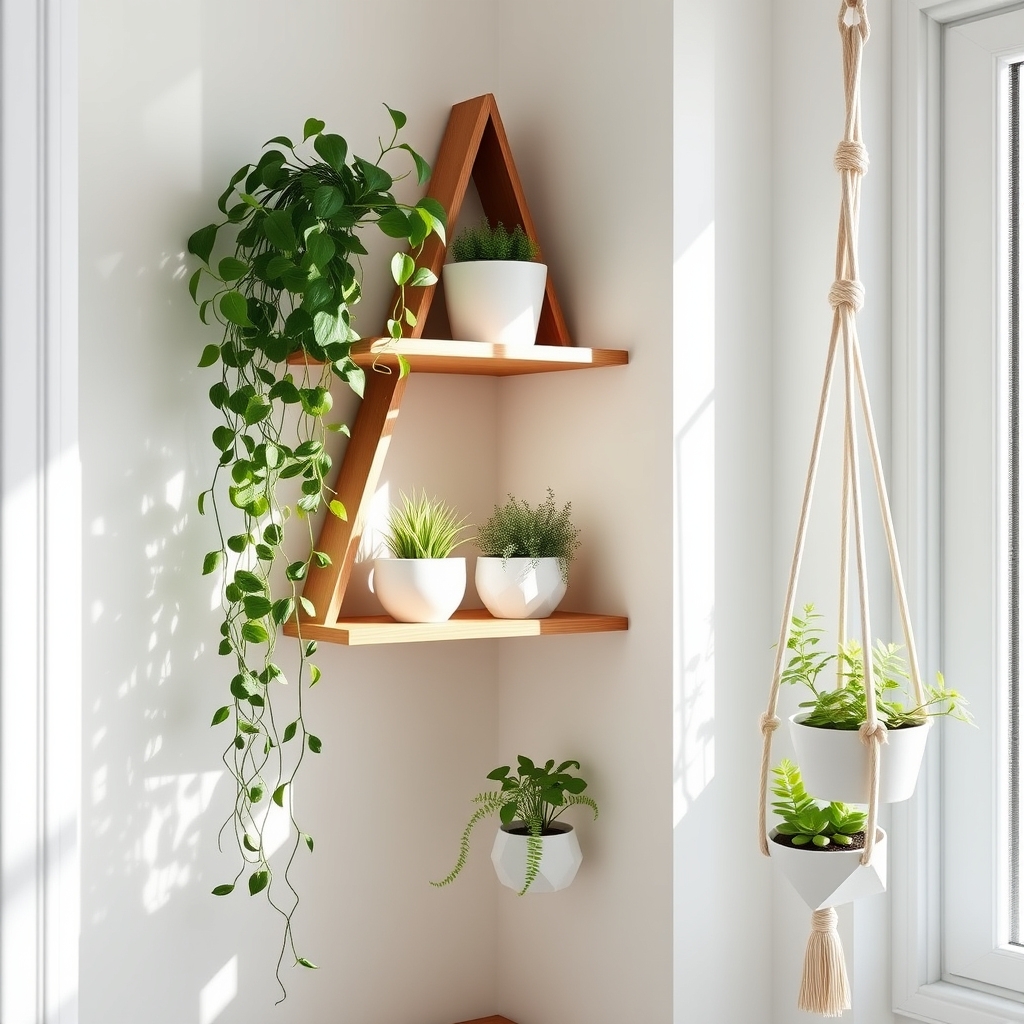
Space-saving corner plant arrangements transform underutilized kitchen corners into vibrant green focal points through strategic vertical and tiered placement of plants.
These setups typically feature graduated shelving units, hanging planters, or corner-specific plant stands that maximize vertical space while minimizing footprint.
Plants are arranged in descending heights, with taller specimens like herbs or trailing pothos positioned at the back, medium-sized plants in the middle, and compact varieties at the front.
Corner-specific mounting brackets and triangular shelving units fit snugly into 90-degree angles, while suspended macramé planters and wall-mounted pockets create depth without consuming counter space.
This efficient design approach allows even small kitchens to incorporate multiple plants without sacrificing valuable work areas.
Water-Wise Plants for Busy Kitchen Environments
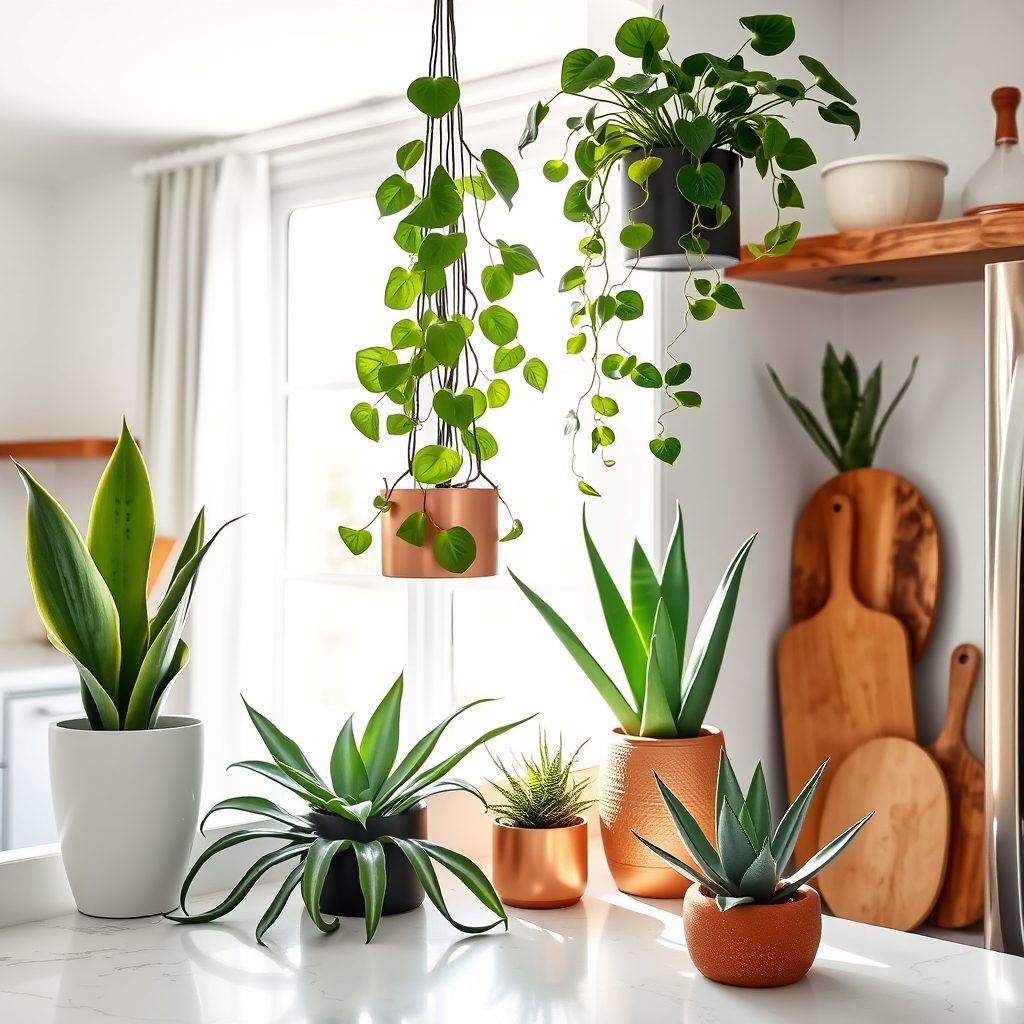
Water-wise plants for busy kitchen environments are low-maintenance greenery specifically suited for areas with fluctuating humidity and irregular watering schedules.
These plants feature adaptive characteristics like thick, fleshy leaves or sturdy stems that store water, allowing them to thrive despite occasional neglect.
Popular options include:
- Snake Plants: Upright, sword-like leaves with variegated patterns
- ZZ Plants: Glossy, dark green leaves on arching stems
- Chinese Evergreen: Broad, patterned leaves in various shades of green and silver
- Pothos: Trailing vines with heart-shaped leaves
- Aloe Vera: Succulent with spiky, gel-filled leaves
These plants survive well in both bright and low-light conditions, resist common kitchen pests, and can handle temperature fluctuations from cooking activities.
Their natural air-purifying qualities make them particularly beneficial in kitchen spaces, while their compact growth habits allow for placement on windowsills, countertops, or hanging planters without taking up valuable workspace.
